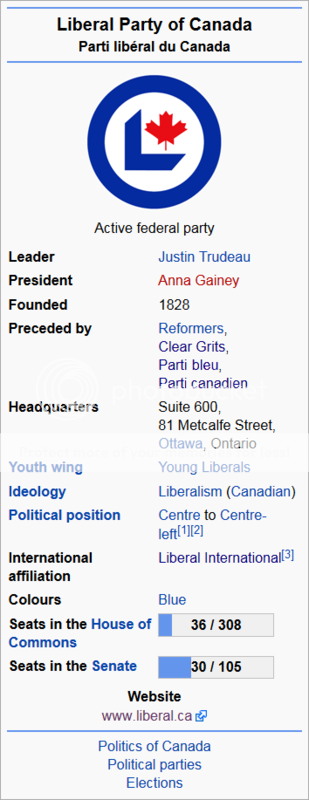Did he not mention that there are and that they're an issue?Another question for Mike: are there any natives on Miranda?
You are using an out of date browser. It may not display this or other websites correctly.
You should upgrade or use an alternative browser.
You should upgrade or use an alternative browser.
Alternate Wikipedia Infoboxes II
- Thread starter Teshuvah
- Start date
- Status
- Not open for further replies.
Another question for Mike: are there any natives on Miranda?
Yes, there are the native quatequia, which are a race of intelligent, human-sized theropods.
Yes, there are the native quatequia, which are a race of intelligent, human-sized theropods.
So, human sized dinosaurs? Kewl.
Do these Bantustans have their own elections, legislatures, etc., or are they governed directly by Washington and/or the nearest state? And are they actually (officially) called Bantustans, or is that just a nickname they've picked up?
So, human sized dinosaurs? Kewl.
Do these Bantustans have their own elections, legislatures, etc., or are they governed directly by Washington and/or the nearest state? And are they actually (officially) called Bantustans, or is that just a nickname they've picked up?
They're fully sovereign nations, though with extremely limited foreign recognition. While nominally independent, whenever Washington says "jump", they're already 10 feet in the air before asking "how high". They're officially First Nation Homelands, but they're commonly called bantustans since, well, that's what they are.
Alf Landon wasn't president in 1944.
I know, but he was the last President.
Not really representative of the situation. Try the person who fulfilled the role of head of state or leading minister, and put down their actual role.I know, but he was the last President.
Four For Gore
Fresh off her landslide victory in 2012, the first two years of Kathleen Sebelius' administration would prove to be, for the most part, uneventful. With the Democrats in control of congress, Sebelius was able to pass most of her agenda through, but aside from economic measures designed to further reduce the effects of the recession, no major legislation would be introduced during Sebelius' first two years, although not for a lack of trying. While Sebelius had initially planned, with her Secretary of Health and Human Services, former Illinois Governor Barack Obama, on introducing a significant overhaul to the country's health-care system, mixed-reactions to this idea led Sebelius to announce that she would hold off on any major reform until after the midterm elections. In foreign affairs, meanwhile, Sebelius would find herself being forced to compromise on her 2012 promise to withdraw troops from the Arab World and the Middle East, slowly withdrawing troops in Afghanistan, Egypt, and Libya, but being forced to announce that U.S. troops would for the time being remain in Iraq and Syria in order to prevent losses to extremist groups.
With the Democrats having a rather uninspiring record in congress, and Sebelius' change of position regarding a key campaign issue, some initially expected that the Republicans would be able to win back control of congress in the midterms, a prediction that might have been true if not for the Republicans' own internal problems. Poor leadership in the Senate from Minority Leader Jon Kyl, but more importantly poor candidate selection, led to the midterm elections generally resulting in a stalemate. The Republicans gained in the House of Representatives, and while they managed to pick up four Senate seats from the Democrats, suffered a net loss of 2 seats due to Democratic gains and the surprise wins of independent candidates Larry Pressler and Greg Orman in South Dakota and Kansas, respectively.

Pressler's and Orman's wins reflected the general mood of the 2014 midterms: a lack of enthusiasm for both the Democrats and the Republicans, and voter disdain for the increasingly unpopular and partisan congress. With Pressler's and Orman's wins, they would join the 3 other independent senators in caucasing together, hoping their collective influence would bridge the partisan divide between the Republicans and Democrats.
With the Democrats still holding a majority in both chambers, though, the Independent Caucus would prove only to have a minimal influence, though the Democrats would often find themselves relying on the caucus to prevent Republican filibusters. While the Democratic leadership experienced a brief crisis following a corruption scandal involving Majority Leader Bob Menendez, his quick replacement as Majority Leader by Nebraska Senator Bob Kerrey helped minimize the damage, and the Democrats were still able to pass their two most significant pieces of legislation. The first, health-care reform, would pass rather easily thanks to the support of the Independent Caucus, despite significant opposition from congressional Republicans and a large number of states. The second, a significant increase on background checks for gun sales, proved to be far more controversial. While the issue had been building due to several high-profile shootings since 2010, the breaking point proved to be a mass shooting at the University of Nevada in the fall of 2015. While the Democratic plan initially called for a larger increase in gun control laws, staunch opposition from the NRA, Republicans, and even a significant number of Democratic senators resulted in the legislation being significantly scaled back to focus primarily on background checks. Despite heavy opposition, the legislation managed to pass thanks to the support of several moderate Republicans as well as the Independent Caucus.
Both pieces of legislation would prove to be defining issues leading up to the 2016 presidential and congressional elections. Republican candidate Condoleezza Rice, who had won the party's nomination over Maryland Senator Michael Steele, New York Governor Rick Lazio, former Massachusetts Governor Mitt Romney, and Virginia Governor Ken Cuccinelli, would hammer Sebelius hard over the issues, and made heavy use of her foreign policy expertise to criticize the Sebelius' administration's foreign policy, particularly in regards to the Middle East.


While Rice would repeatedly be congratulated for running an excellent campaign, it was still not enough to defeat Sebelius, and Rice was unable to overcome the poor memories of the Giuliani administration. In hindsight, many have argued that Rice had picked the wrong year to run for President: had she run in 2012, her personal popularity and campaign skills could likely have led to her eking out a narrow victory in a close three-way race, and had she run in 2020 she would likely have had the advantage of incumbency fatigue. While Rice failed to win nationally, her campaign would nevertheless be a significant boon to Republicans down ballot, with the party picking up five seats in the Senate and making further gains in the House of Representatives, and despite narrowly failing to take control away from the Democrats, Republicans have set their eyes forward to 2018...
Four For Gore
US presidential elections of 2000 and 2004, and senate elections of 2002 and 2004
Canadian federal elections of 2004 and 2005
US presidential election of 2008, and senate elections of 2006 and 2008
Canadian federal election of 2010
US presidential election of 2012, and senate elections of 2010 and 2012
Canadian federal election of 2012
Canadian federal election of 2014
The Hour with George W. Bush
Fresh off her landslide victory in 2012, the first two years of Kathleen Sebelius' administration would prove to be, for the most part, uneventful. With the Democrats in control of congress, Sebelius was able to pass most of her agenda through, but aside from economic measures designed to further reduce the effects of the recession, no major legislation would be introduced during Sebelius' first two years, although not for a lack of trying. While Sebelius had initially planned, with her Secretary of Health and Human Services, former Illinois Governor Barack Obama, on introducing a significant overhaul to the country's health-care system, mixed-reactions to this idea led Sebelius to announce that she would hold off on any major reform until after the midterm elections. In foreign affairs, meanwhile, Sebelius would find herself being forced to compromise on her 2012 promise to withdraw troops from the Arab World and the Middle East, slowly withdrawing troops in Afghanistan, Egypt, and Libya, but being forced to announce that U.S. troops would for the time being remain in Iraq and Syria in order to prevent losses to extremist groups.
With the Democrats having a rather uninspiring record in congress, and Sebelius' change of position regarding a key campaign issue, some initially expected that the Republicans would be able to win back control of congress in the midterms, a prediction that might have been true if not for the Republicans' own internal problems. Poor leadership in the Senate from Minority Leader Jon Kyl, but more importantly poor candidate selection, led to the midterm elections generally resulting in a stalemate. The Republicans gained in the House of Representatives, and while they managed to pick up four Senate seats from the Democrats, suffered a net loss of 2 seats due to Democratic gains and the surprise wins of independent candidates Larry Pressler and Greg Orman in South Dakota and Kansas, respectively.

Pressler's and Orman's wins reflected the general mood of the 2014 midterms: a lack of enthusiasm for both the Democrats and the Republicans, and voter disdain for the increasingly unpopular and partisan congress. With Pressler's and Orman's wins, they would join the 3 other independent senators in caucasing together, hoping their collective influence would bridge the partisan divide between the Republicans and Democrats.
With the Democrats still holding a majority in both chambers, though, the Independent Caucus would prove only to have a minimal influence, though the Democrats would often find themselves relying on the caucus to prevent Republican filibusters. While the Democratic leadership experienced a brief crisis following a corruption scandal involving Majority Leader Bob Menendez, his quick replacement as Majority Leader by Nebraska Senator Bob Kerrey helped minimize the damage, and the Democrats were still able to pass their two most significant pieces of legislation. The first, health-care reform, would pass rather easily thanks to the support of the Independent Caucus, despite significant opposition from congressional Republicans and a large number of states. The second, a significant increase on background checks for gun sales, proved to be far more controversial. While the issue had been building due to several high-profile shootings since 2010, the breaking point proved to be a mass shooting at the University of Nevada in the fall of 2015. While the Democratic plan initially called for a larger increase in gun control laws, staunch opposition from the NRA, Republicans, and even a significant number of Democratic senators resulted in the legislation being significantly scaled back to focus primarily on background checks. Despite heavy opposition, the legislation managed to pass thanks to the support of several moderate Republicans as well as the Independent Caucus.
Both pieces of legislation would prove to be defining issues leading up to the 2016 presidential and congressional elections. Republican candidate Condoleezza Rice, who had won the party's nomination over Maryland Senator Michael Steele, New York Governor Rick Lazio, former Massachusetts Governor Mitt Romney, and Virginia Governor Ken Cuccinelli, would hammer Sebelius hard over the issues, and made heavy use of her foreign policy expertise to criticize the Sebelius' administration's foreign policy, particularly in regards to the Middle East.


While Rice would repeatedly be congratulated for running an excellent campaign, it was still not enough to defeat Sebelius, and Rice was unable to overcome the poor memories of the Giuliani administration. In hindsight, many have argued that Rice had picked the wrong year to run for President: had she run in 2012, her personal popularity and campaign skills could likely have led to her eking out a narrow victory in a close three-way race, and had she run in 2020 she would likely have had the advantage of incumbency fatigue. While Rice failed to win nationally, her campaign would nevertheless be a significant boon to Republicans down ballot, with the party picking up five seats in the Senate and making further gains in the House of Representatives, and despite narrowly failing to take control away from the Democrats, Republicans have set their eyes forward to 2018...
Four For Gore
US presidential elections of 2000 and 2004, and senate elections of 2002 and 2004
Canadian federal elections of 2004 and 2005
US presidential election of 2008, and senate elections of 2006 and 2008
Canadian federal election of 2010
US presidential election of 2012, and senate elections of 2010 and 2012
Canadian federal election of 2012
Canadian federal election of 2014
The Hour with George W. Bush
Four For Gore
Very Interesting stuff: No Tea Party, more competent Democrats and what appears to be a Third Party bloc forming!
That said, I'm a bit sceptical that Condi Rice has ever found Electoral Politics remotely appealing OTL. What's she been doing ITTL?
I like this Democratic Party more than OTL's one. I have a feeling they're somewhat more populist than OTL.
Very Interesting stuff: No Tea Party, more competent Democrats and what appears to be a Third Party bloc forming!
That said, I'm a bit sceptical that Condi Rice has ever found Electoral Politics remotely appealing OTL. What's she been doing ITTL?
Apparently not being the NFL Commissioner we need.
And I'm not so sure about Kerrey as Majority Leader. Kerrey is very mercurial and unpredictable. He could literally retire at any moment because he feels like it. Which is what happened in OTL.
The 2016 US General Election was a hotly contested one following Prime Minister Obama's customary retirement after 8 years of leading the nation. Barack's heir apparent, Minister Hillary Clinton, naturally assumed the leadership role for the Dems, and assured that the current coalition with the Progressives would hold true for the upcoming election. The Republicans, still trying to recover from the secession of the Tea Party and Libertarians in 2008, had a long, hard fought struggle for the leader's spot previously held by Minister John Boehner after he resigned, which resulted in Minister Scott Walker gaining control. With many of both the Tea Party and the Republican Party switching alignments to the Libertarian Party, Both needed a good result in the upcoming election badly. In the end, the Tea Party took a tumble in the polls with the Libertarians and Republicans benefiting, even thought the Libertarians only gained votes and no Ministers. But all three failed to trump the left wing coalition of the Democrats and the Progressives, who retained enough seats to keep their government in place.

Hey guys, so guess what? It turns out that I'm also capable of making non-silly Wikiboxes! Wait, President Tom Selleck isn't silly, right? 
Anyway, it's based on the scenario I outlined in this thread about actors becoming President.
Tom Selleck is a Republican Hollywood tough guy who is just liberal enough on social issues to be palatable to left-leaning California voters. Actually, he calls himself an "Independent with libertarian leanings" but his record of endorsements and donations put him firmly in the GOP. He essentially occupies the same political niche as Arnold Schwarzenegger, except unlike Arnold, Selleck is actually eligible to be President. Our POD is that in 2003, Selleck throws his hat into the chaotic California gubernatorial recall election. The Republican establishment quickly lines up behind him just like they did Arnold in OTL, since they know that a celebrity is their only hope of winning in liberal California. Arnold doesn't run and Selleck wins by a similar margin. Selleck is very outspoken on gun rights issues, which could alienate some of the moderate voters that Schwarzenegger won, so I moved 3 points from Schwarzenegger's totals to Bustamante, and 1 point from McClintock to Selleck to take that into account.
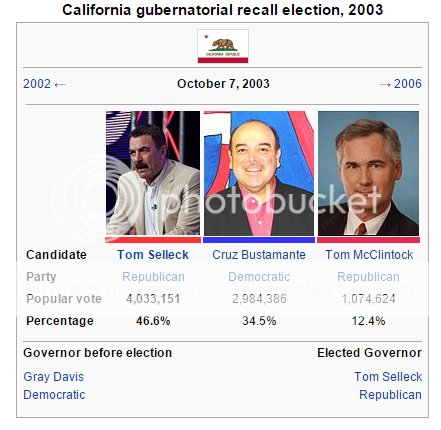
After his election, Selleck becomes the darling of GOP. He gets a prime time speaking slot at the 2004 RNC and there is even speculation that he may run for President in 2008. Again, all of this happened for Arnold in OTL, and he's not even eligible to be President.
His first term goes a little better than Schwarzenegger's (I'm guessing he probably has less mistresses and love children to distract him) and he is re-elected in a landslide slightly larger Arnold's. I transferred one point from Angelides to Selleck and also gave him half of the Libertarian candidate's total, since a Libertarian candidate will get less traction against Selleck than against Schwarzenegger.
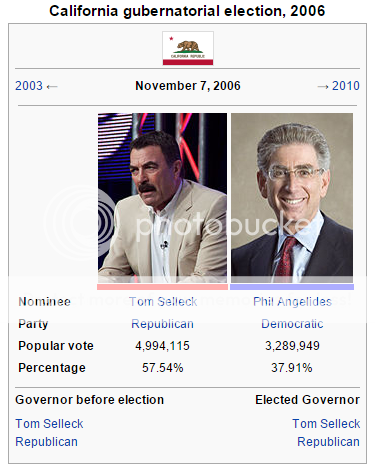
In 2008, Governor Selleck seeks the Republican nomination for President as expected. Like Romney did in OTL, he moves to the right a bit to prepare for his run, but he's still firmly in the moderate wing of the GOP. He supports civil unions but not marriage for gays (the standard moderate line at the time) and comes out against abortion except in the case of rape, incest, or to save the life of the mother (right-of-center, but not crazy, should be conservative enough to satisfy the religious right). Selleck is successful in the west and some parts of the northeast, but has difficult with social conservatives in the south over his recent "flip-flops" on social issues. He basically draws his support from Romney and McCain, although he also takes some of Ron Paul's supporters, with his heavy emphasis on civil liberties. In the end, he loses out to McCain, but it's a respectable 2nd place finish.
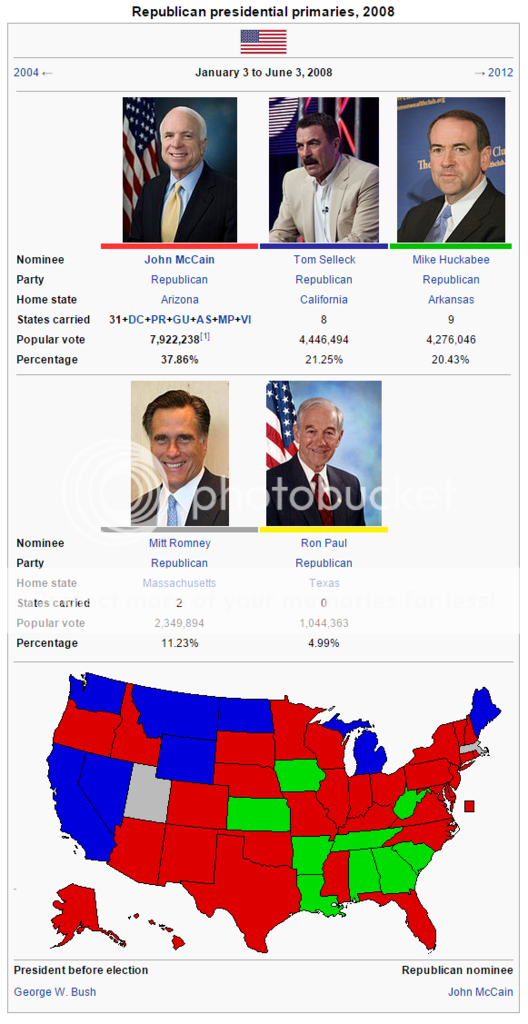
Shortly after Governor Selleck drops out the Presidential race, John McCain taps him to be his running mate. This raises a few eyebrows, since McCain was expected to pick a strong religious right-type to shore up his conservative bona fides. But you know McCain, he gets maverick-y sometimes. The McCain-Selleck ticket performs better in most of the country due to Selleck not being as, um, "unconventional" as Palin. However this impact is not as strong in the south, where McCain and Selleck are both seen as somewhat suspect by social conservatives. McCain still loses. There was no way a Republican was going to win with the economic collapse in 2008. But it is a little less embarrassing than OTL with Republicans holding the line in Indiana and that one Nebraska congressional district.
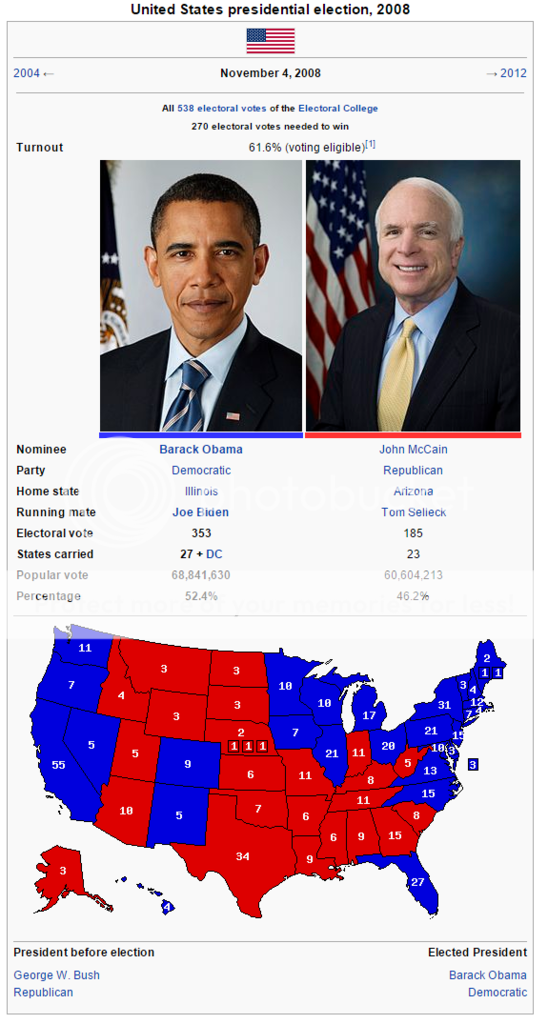
Going into 2012, former Governor Selleck is the prohibitive favorite for the nomination. The Reagan comparisons are obvious. He's a former actor turned Governor of California who is in his upper-60s but definitely doesn't look it. As if that's not enough, he was runner up last time around and is running against a liberal incumbent. Yeah, the GOP is having a Reagan-gasm right about now. Selleck does face token opposition in the primaries from the likes of Rick Santorum (social conservatives who still haven't gotten over the flip-flops), Ron Paul (no way he wasn't going to run, his support is basically cult-like), and Newt Gingrich (raging egomania), but this opposition is roughly analogous to what the Bushes faced in 1988 and 2000. Santorum wins an upset in Iowa that scares everybody for 10 seconds, but from there it's smooth sailing. It's basically a coronation. He wins 47 states. I didn't even bother to map it.
Governor Selleck selects Florida Senator Marco Rubio as his running mate. The Obama-Selleck debates are really a sight to behold. Obama is the smooth operator with a winning smile. Selleck is the firm but caring father figure who want to reintroduce some good old fashioned sanity into a world gone mad (if you've ever seen Blue Bloods, that's the tone I'm talking about). All three debates are highly-rated television spectacles. Consensus is that Selleck probably won two out of three, but all were close. Selleck's celebrity turns out voters who might otherwise have stayed home, and he ends up winning by a razor thin margin.
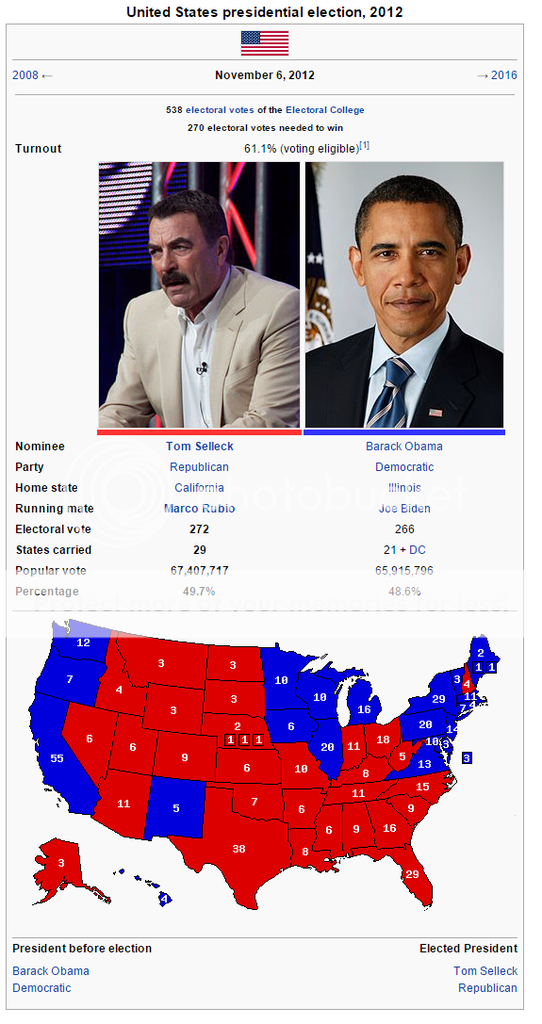
So, plausible?
Anyway, it's based on the scenario I outlined in this thread about actors becoming President.
Tom Selleck is a Republican Hollywood tough guy who is just liberal enough on social issues to be palatable to left-leaning California voters. Actually, he calls himself an "Independent with libertarian leanings" but his record of endorsements and donations put him firmly in the GOP. He essentially occupies the same political niche as Arnold Schwarzenegger, except unlike Arnold, Selleck is actually eligible to be President. Our POD is that in 2003, Selleck throws his hat into the chaotic California gubernatorial recall election. The Republican establishment quickly lines up behind him just like they did Arnold in OTL, since they know that a celebrity is their only hope of winning in liberal California. Arnold doesn't run and Selleck wins by a similar margin. Selleck is very outspoken on gun rights issues, which could alienate some of the moderate voters that Schwarzenegger won, so I moved 3 points from Schwarzenegger's totals to Bustamante, and 1 point from McClintock to Selleck to take that into account.

After his election, Selleck becomes the darling of GOP. He gets a prime time speaking slot at the 2004 RNC and there is even speculation that he may run for President in 2008. Again, all of this happened for Arnold in OTL, and he's not even eligible to be President.
His first term goes a little better than Schwarzenegger's (I'm guessing he probably has less mistresses and love children to distract him) and he is re-elected in a landslide slightly larger Arnold's. I transferred one point from Angelides to Selleck and also gave him half of the Libertarian candidate's total, since a Libertarian candidate will get less traction against Selleck than against Schwarzenegger.

In 2008, Governor Selleck seeks the Republican nomination for President as expected. Like Romney did in OTL, he moves to the right a bit to prepare for his run, but he's still firmly in the moderate wing of the GOP. He supports civil unions but not marriage for gays (the standard moderate line at the time) and comes out against abortion except in the case of rape, incest, or to save the life of the mother (right-of-center, but not crazy, should be conservative enough to satisfy the religious right). Selleck is successful in the west and some parts of the northeast, but has difficult with social conservatives in the south over his recent "flip-flops" on social issues. He basically draws his support from Romney and McCain, although he also takes some of Ron Paul's supporters, with his heavy emphasis on civil liberties. In the end, he loses out to McCain, but it's a respectable 2nd place finish.

Shortly after Governor Selleck drops out the Presidential race, John McCain taps him to be his running mate. This raises a few eyebrows, since McCain was expected to pick a strong religious right-type to shore up his conservative bona fides. But you know McCain, he gets maverick-y sometimes. The McCain-Selleck ticket performs better in most of the country due to Selleck not being as, um, "unconventional" as Palin. However this impact is not as strong in the south, where McCain and Selleck are both seen as somewhat suspect by social conservatives. McCain still loses. There was no way a Republican was going to win with the economic collapse in 2008. But it is a little less embarrassing than OTL with Republicans holding the line in Indiana and that one Nebraska congressional district.

Going into 2012, former Governor Selleck is the prohibitive favorite for the nomination. The Reagan comparisons are obvious. He's a former actor turned Governor of California who is in his upper-60s but definitely doesn't look it. As if that's not enough, he was runner up last time around and is running against a liberal incumbent. Yeah, the GOP is having a Reagan-gasm right about now. Selleck does face token opposition in the primaries from the likes of Rick Santorum (social conservatives who still haven't gotten over the flip-flops), Ron Paul (no way he wasn't going to run, his support is basically cult-like), and Newt Gingrich (raging egomania), but this opposition is roughly analogous to what the Bushes faced in 1988 and 2000. Santorum wins an upset in Iowa that scares everybody for 10 seconds, but from there it's smooth sailing. It's basically a coronation. He wins 47 states. I didn't even bother to map it.
Governor Selleck selects Florida Senator Marco Rubio as his running mate. The Obama-Selleck debates are really a sight to behold. Obama is the smooth operator with a winning smile. Selleck is the firm but caring father figure who want to reintroduce some good old fashioned sanity into a world gone mad (if you've ever seen Blue Bloods, that's the tone I'm talking about). All three debates are highly-rated television spectacles. Consensus is that Selleck probably won two out of three, but all were close. Selleck's celebrity turns out voters who might otherwise have stayed home, and he ends up winning by a razor thin margin.

So, plausible?
Last edited:
Maybe a butterfly or two was killed, but overall, I'd be cool with President Selleck. 
Maybe a butterfly or two was killed, but overall, I'd be cool with President Selleck.
Yeah, I thought that Obama winning exactly the same number of votes as OTL in 2012 was a little strange. But I wanted to emphasize that Selleck was drawing in new voters rather than taking them from Obama.
Last edited:
- Status
- Not open for further replies.
Share:



